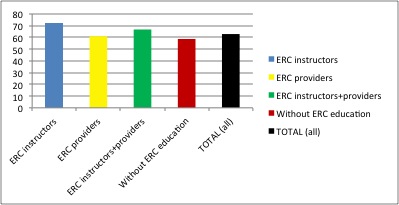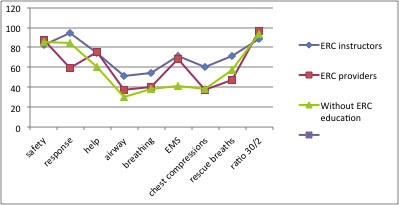


Theme
7JJ The Teacher
INSTITUTION
Croatian Resuscitation Council
Croatian Association for Medical Education
University of Zagreb School of Medicine

It is well known from the literature that newly qualified medical doctors have insufficient practical skills needed for the care of acute patients, including cardiopulmonary resuscitation (CPR) skills. It is however unknown if medical teachers should be internationally recognised CPR instructors or just giving them CPR guidelines is enough to teach CPR skills to medical students. During the academic year 2011/12 a longitudinal course “Fundamentals of clinical skills”, including a session on CPR, has been introduced at the University of Zagreb, School of Medicine. Out of 32 teachers from different clinical background there were 5 ERC (European Resuscitation Council) CPR instructors and 5 ERC CPR Providers.

Retention of CPR skills after two years tested by standardised ERC CPR Assessment sheet (pre-test) is better for students trained by teachers with ERC CPR background compared to second group of students trained by medical teachers without ERC background (p<0,01), in particular for skills: call for help (p<0,01), open airway (p<0,01), assess breathing (p<0,01), get help-EMS (p<0,01) and chest compressions (p<0,01)

The purpose of this study was to investigate whether the background training of medical teachers in CPR influences medical students’ learning outcome. During the academic year 2013/14 ERC CPR/AED Course was introduced as the part of the “Fundamentals”. At the beginning of each CPR/AED Course students were tested for retention of their CPR skills using standardised ERC CPR Assessment sheet (pre-test). There were total of 130 3rd year students followed from their 1st year, 67 students trained by ERC Instructors and Providers (35 and 32, respectively) and 63 students trained by 10 medical teachers without ERC background
Retention of CPR skills after two years is better for students trained by teachers with ERC background compared to students trained by teachers without internationally recognised CPR training.
The practical relevance of this research is to introduce a standardised, internationally recognised training in CPR according to European Resuscitation Council for medical teachers at the University of Zagreb, School of Medicine.
 Send Email
Send Email